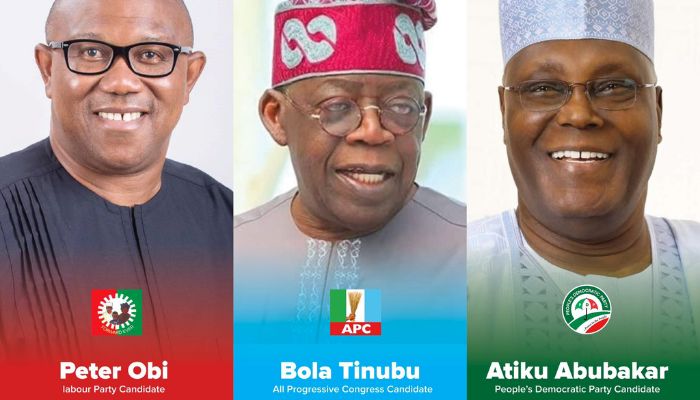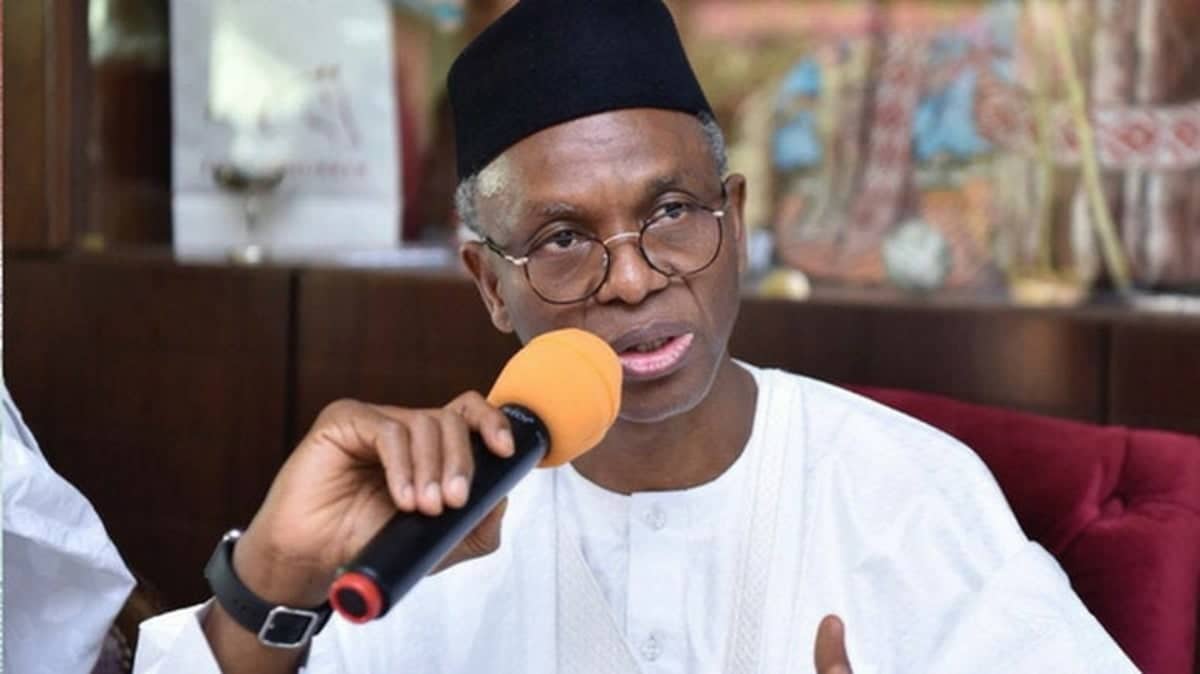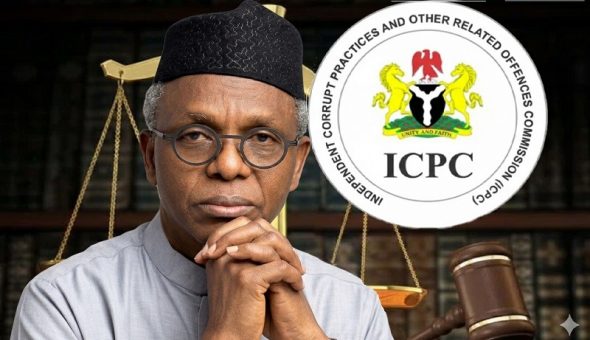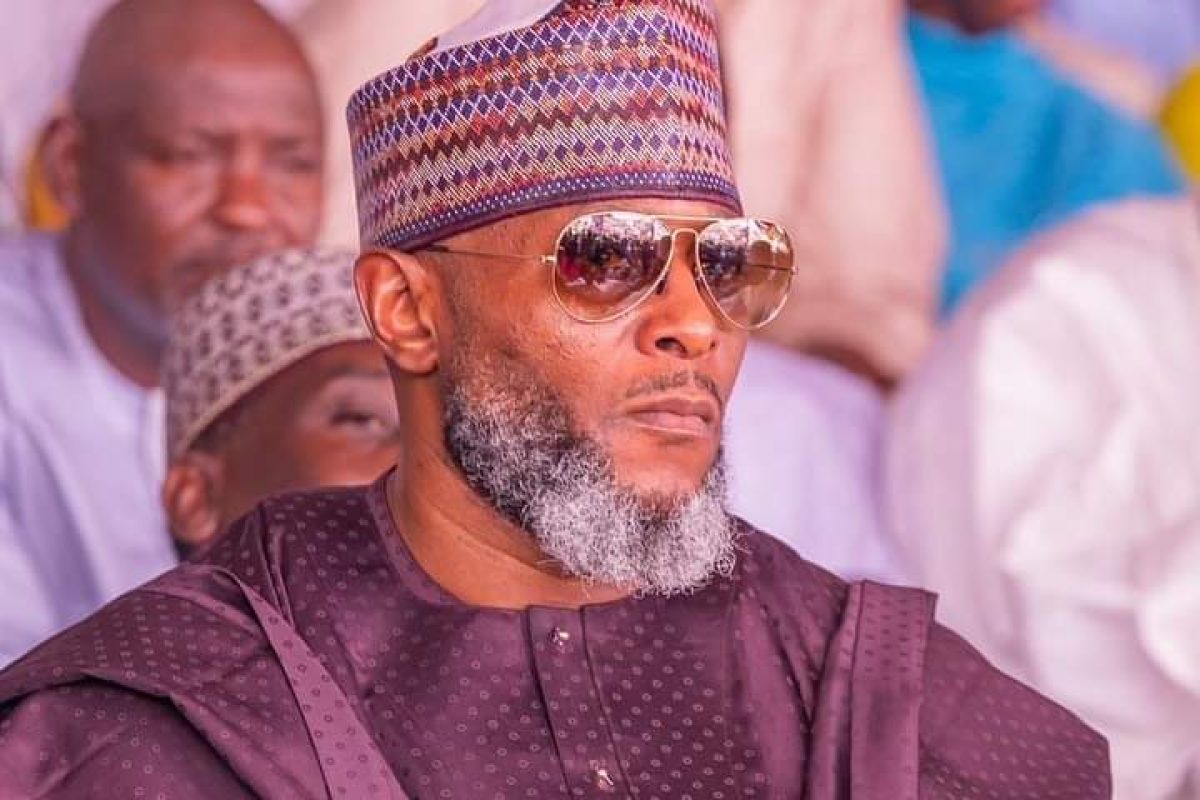LIVE UPDATES: Court delivers high-stake judgement on Atiku’s, Obi’s Presidential Election Petition against Tinubu’s victory
The Presidential Election Petition Court in Abuja will give judgments on three petitions by Atiku, Peter Obi, and a political party challenging the credibility of President Tinubu’s victory in the February presidential poll.
The Presidential Election Petition Court in Abuja will today (Wednesday) deliver its much-anticipated, high-stake judgement on three petitions challenging the election of President Bola Tinubu.
Mr Tinubu’s win as the candidate of the All Progressives Congress (APC) in the 25 February has been eclipsed by the opposition’s allegations of fraud in the process that was eagerly monitored around the world.
There are three pending petitions filed in court in the aftermath of the election challenging the credibility of Mr Tinubu’s victory which the five-member panel of the court will decide on today.
Two of the petitions were filed by the leading opposition presidential candidates – Atiku Abubakar of the Peoples Democratic Party (PDP), who came second behind Mr Tinubu, and Peter Obi of the Labour Party, who took the third position, according to the Independent National Electoral Commission (INEC).
A total of 18 candidates contested the election.
The third petition was filed by a political party, the Allied Peoples Movement (APM), whose presidential candidate, Chichi Ojei, scored 25,961 votes out of the over 28 million votes cast during the election.
There were two other petitions filed by the Action Peoples Party (APP) and the Action Alliance (AA) at the court before the close of the window for filing presidential election petitions in March but were withdrawn before hearing began.
The two separate but typical petitions filed by Atiku and Mr Obi, centre on election and pre-election issues.
They attacked the qualification of Mr Tinubu to contest the election, the legality of the nomination of his running mate, the integrity of the election process, and the threshold of the spread of votes used by INEC to declare Mr Tinubu as the winner of the poll.
Both Atiku and Mr Obi individually asked the court to either declare them the winner of the election or order a fresh poll. Should the court choose to order a fresh election, they prayed that Mr Tinubu and his party, the APC, should be barred from participating in it.
The APM did not claim to have won the election. Its petition, anchored on the sole ground of alleged double nomination of Mr Tinubu’s running mate and present-day Vice President, Kashim Shettima, sought the cancellation of APC’s votes and declaration of Atiku the winner of the poll.
Mr Tinubu was inaugurated as Nigeria’s 16th leader in May, three months after the disputed election, while the opposition candidates continued to wage a legal challenge to his victory in court.
Also Read: Judgement Day: Tension as Presidential Election Tribunal delivers verdict
The court’s judgement, which will be televised live, is a high-stake decision that will get attention beyond Nigeria.
At home, with the broad spectrum of interests fixated on the cases since March, the judgement, whichever way it goes, will impact heavily on public confidence in the judiciary, and INEC alongside its heavily funded technological tools it deployed nationwide for the first time during the 2023 elections.
Also, Mr Tinubu’s election as Nigeria’s president, which the court is going to decide on today, goes to the root of his standing as the chair of the West African regional body, ECOWAS.
Many within and outside Nigeria are also looking forward to the judgement as the basis for reassessment of his credibility as a critical voice on the African continent, which is seeing a new wave of disputed elections followed by coups in different African countries.
The judgement is coming at a time when Mr Tinubu’s advocacy for entrenchment of democratic rule in Africa is resonating across Africa and the world.
PulseNets is on the ground to provide you with live updates as the judgement is being delivered by the five-member panel of the court in Abuja today.
The panel of five judges comprising four men and a woman is led by Haruna Tsammani (63).
The other members are: Stephen Adah (65), Misitura Bolaji-Yusuf (63), Moses Ugo (57), and Abba Mohammed (62).
LIVE
The five-member bench is scheduled to begin its judgement at 9 a.m.
Atiku and Mr Obi anchored their petitions on, among other claims, that Mr Tinubu was not qualified to contest the election, citing discrepancies in his academic records and previous judicial indictment.
The petitioners alleged that Mr Tinubu was not eligible to contest the 25 February election after a 1993 decision of the United States District Court, Northern District of Illinois, Eastern Division, ordering him to forfeit $460,000 in a case involving drugs trafficking.
The petitioners similarly alleged that Mr Tinubu’s running mate, Mr Shettima, was illegally nominated for two separate constituencies in the same election cycle – as Borno Central senatorial candidate and vice-presidential candidate for the whole of Nigeria – therefore rendering their joint ticket invalid.
The petitioners also alleged widespread suppression of votes as well as manipulation and alteration of results to favour Mr Tinubu in, cumulatively, more than 25 states of the federation.
According to the leading opposition candidates, the election was also marred by the failure of INEC to upload photographic copies of polling unit results on its Results Viewing (IReV) portal promptly as stipulated in the election guidelines.
They also complained that Mr Tinubu failed to meet full constitutional requirements to be declared the winner of the election because of his failure to secure 25 per cent of the votes in the Federal Capital Territory (FCT), Abuja.
Mr Tinubu’s opponents said by failing to secure 25 per cent of the votes in the federal capital, he did not meet the full constitutional requirement to be declared the winner, an issue that they gave an extraordinary stress at the hearing of the cases.
But INEC, Mr Tinubu, and the APC urged the court to dismiss the petitions on the grounds that they were founded on wrong legal interpretations while the petitioners also failed to provide evidence to substantiate alleged irregularities and results manipulations.
8.47 a.m: Vice-President Kashim Shettima has arrived at the courtroom ahead of the judgement scheduled to begin at 9 a.m.

The National Security Adviser (NSA), Nuhu Ribadu; APC National Chairman, Abdullahi Ganduje; Nasarawa State Governor, Abdullahi Sule and his Bauchi State counterpart, Bala Mohammed are also seated in court ahead of the verdict.
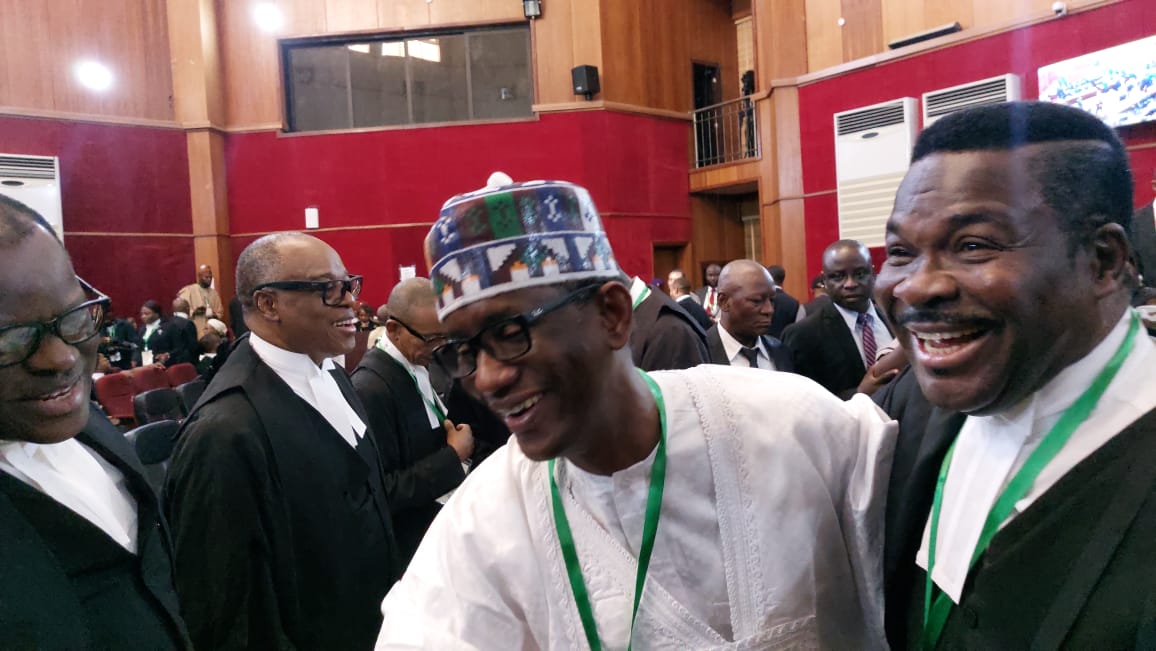
8.54 a.m: Some APC governors, including Governors Yahaya Bello of Kogi State, Hope Uzodinma of Imo State, and Mai Mala Buni of Yobe State, have arrived at the courtroom.
8: 53 a.m: Another APC governor, Governors Biodun Oyebanji of Ekiti Ekiti State also arrived with his Kogi, Imo and Yobe counterparts.
8:59 a.m: Aviation Minister, Festus Keyamo, arrives court.
9.06 a.m: Vice-President Shettima exchanges pleasantries with lawyers as he finds his way to his seat.

9.27a.m: The five judges file in and take their seats.
The proceedings will begin any moment from now.
9.28 a.m: The head of the five-member bench, Haruna Tsammani, welcomed everyone to the packed courtroom.
He describes the proceedings as “the zenith” of the hearing.
He says the judgement on the three cases is lengthy and may take few hours.
9.31 a.m: The panel is to begin with Peter Obi’s case.
A court official announces the case and the party.
9.32. a.m: Vice-President Kashim Shettima represents President Tinubu and himself.
9.33 a.m: Julius Abure, the chair of the Labour Party, represents the party. Mr Obi is absent.
9.35 a.m: Abdullahi Ganduje, the chair of APC, represents the party.
9.37 a.m: The lead counsel for the Labour Party and Mr Obi, Livy Ozoukwu, announces his appearance and the names of other lawyers with him.
9.38a.m: Stephen Adehi, a SAN, announces appearance for INEC.
9.39a.m: A.A Malik, a SAN, announces for Mr Tinubu.
9.40 a.m: Charles Edosomwan, a SAN, announces appearance for the APC
9:42 a.m: Court official calls APM petition against President Bola Tinubu.
9: 43 am: May Agbamuche-Mbu announces representation for INEC
9: 44 a.m: Vice-President Shettima stood up for recognition. Abdullahi Ganduje announces representation for APC.
9: 45 a.m: APM lawyer announces appearance.
9.48 a.m: Charles Edosamwan, SAN, announces appearance for APC.
9: 49 a.m: A A Malik announces appearance for Mr Shettima and APC.
9.52 a.m: Court official calls the third case – Atiku’s case.
9:52 a.m: PDP’s Acting National Chairman, Umar Damagum, announces self as representatives of Atiku and his party.
9:55 a.m: Chris Uche (SAN) announces legal representation for Atiku and PDP.
9.56 a.m: Stephen Adehi, a SAN, announces his team’s appearance for INEC.
9: 58 a.m: AA Malik, a SAN, announces appearance for Mr Tinubu.
9: 59 a.m: Charles Uwensuyi-Edosomwan announces appearance for APC
10.00 a.m: The head of the five-member bench, 63-year-old Haruna Tsammani, says the court will begin the judgement on petition No. 4, the APM’s case.
10.04 am: APM argues that Vice-President Shettima was not qualified to contest the 25 February presidential election as Mr Tinubu’s running mate as his nomination violated Section 35 of Electoral Act 2022, and other constitutional provisions.
The party prays the court to void the votes polled by the APC in the election.
10.06 a.m: APM urges the court to declare the candidate with the next highest scores as the winner of the election.
10.08 a.m: Mr Tsammani highlights applications filed by the respondents requesting that some paragraphs of APM’s petition be struck out.
10.10 a.m: Mr Tsammani clarifies that the court is sitting as the Court of Appeal and not as a tribunal.
10: 15 a.m: Mr Tsammani highlights respondents’ argument that the APM cannot introduce a new issue or fact after the petition was filed.
10.15 a m: INEC had complained against APM’s introduction of new facts during the hearing of its petition.
10: 26 a.m: Mr Tsammani says it is clear that the claim of qualification or non-qualification is a pre-election matter.
10.32 a.m: Mr Tsammani says the issue of disqualification raised by the APM in its petition ought to have been ventilated at the Federal High Court. He says the presidential election court does not have jurisdiction to hear it.
10.38 a.m: Mr Tsammani also highlights the respondents’ objection that the issue raised by APM ought to have been raised at the Federal High Court within 180 days from 27 July 2022 when Mr Shettima as the APC’s vice-presidential candidate. The window for the litigation on such issue, the respondents say, lapsed in January 2023.
10: 42 a.m: The issue of qualification of a candidate of a political party is not an all comers’ affair – Mr Tsammani.
He adds that it is not the business of a political party is not the business of another political party.
10:44 a.m: Mr Tsammani says it is clear that APM only has the right to file the complaint raised in its petition when the nomination of a candidate by another party affects it.
In the instant case, the petition is incompetent and ought to be struck out for lacking in merit, the judge adds.
10.50 a.m: Mr Tsammani now begins considering APM’s substantive petition on merit.
Mr Tsammani notes that after the pre-hearing session, the APM opened and closed its case with one witness on 21 June 2023.
He says none of the respondents called any witness, but only tendered some documents from the bar.
10.53 a.m: Mr Tsammani says it is clear that the APM’s petition is anchored on the non-qualification of Vice-President Shettima.
10.56 a.m: Mr Tsammani says the APM’s case centres on the allegation that while Mr Shettima was still the APC’s Borno Central senatorial candidate, he was nominated by the party and he did accept the nomination of the vice-presidential candidate of the part.
He says that the APM argued that this amounts to double nomination which is illegal and leads to disqualification.
10.58 a.m: Mr Tsammani sets out the constitutional requirements for qualification to run for the presidency:
– The person must be a citizen of Nigeria by birth.
– The person must be 40 years old or above.
– The person must be a member of a political party.
– The person must be sponsored or nominated by that political party.
– The person must be educated to the level of a secondary school certificate or its equivalent.
11.02 a.m: Mr Tsammani says the NIgerian constitution having established the qualifying and disqualifying factors, no court can create other qualifying or disqualifying factors. He says the Supreme Court has followed this principle in all cases.
11.09 a.m: Mr Tsammani notes that the issue of double nomination of Mr Shettima has been resolved by the Supreme Court.
He rejects the argument of the APM that it has the right to relitigate the issue at the presidential election petition court because it was not a party to the case decided by the Supreme Court.
The panel chairman says it is clear that the APM was not a party to the case, but is also clear that the same issue raised in the instant petition was the same issue the Supreme Court resolved in the earlier case.
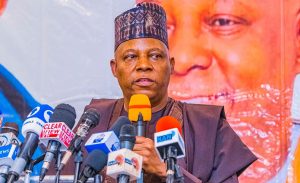
He also rejects the APM’s argument that the issue was not resolved in the lead judgement of the Supreme Court, explaining that a supporting judgement in which the matter was resolved is binding.
11:20 a.m: Mr Tsammani says it is clear to from the oral and documentary evidence that the APM has not established the allegation of double nomination against Mr Shettima.
11.23 a.m: Mr Tsammani says there is nothing in the Nigerian constitution that stops a presidential candidate from replacing his running mate within 90 days, and there is also nothing that invalidates the nomination of the substitute within the stipulated period.
11.24 a.m: He resolves the sole issue of double nomination of Mr Shettima against the petitioner. He says it means the petition lacks merit.
11.27a.m: The panel goes on break for 15 minutes.
11:42: Court resumes sitting.
11:45 a.m: One of the five-member panel of Justices, Abba Mohammed, reads ruling on preliminary objections filed by the respondents against Peter Obi’s petition.
12: 06 p.m: Mr Mohammed highlights a contention by the respondents that Mr Obi’s petition only alleged widespread irregularities without giving the particulars and in which polling units.
He says the petition stated that fictitious results were uploaded without stating the affected polling units.
He says the petition alleged over-voting and rigging without stating in which polling units they took place.
The petitioners only made generic allegations, Mr Mohammed says.
12.12 p.m: The petitioners made generic allegations of irregularities and said they would rely on spreadsheets, inspection reports and forensic analysis filed with the petition during trial.
But he says the documents promised by the petitioners were not attached to the petition and served on the respondents.
12.20 p.m: Mr Mohammed also says Mr Obi and his Labour party failed to provide particulars of corrupt practices, suppression of votes, entry of fictitious results and other irregularities in their pleadings.
12.30 p.m: The court faults respondents’ contention challenging Mr Obi’s membership of the Labour Party.
Mr Mohammed says only a political party can determine who its members are, and that no other person or entity can probe into it.
12.33 p.m: The court also faults the respondents’ objection which faulted the Labour Party’s petition on the grounds that it failed to join Atiku Abubakar who came second in the election.
Mr Mohammed says a petitioner is not under any obligation to join a candidate who lost the election like himself in his petition.
He says a petitioner is only obligated to join the person and the political party who won the election and the commission who conducted the election as parties to his petition.
12.46 p.m: Justice Haruna Tsammani takes over to deliver judgement on the substantive petition filed by Mr Obi and the Labour Party.
12.48 p.m: Mr Tsammani says Mr Obi called 13 witnesses who testified as PW1 to PW13.
Of the 13 witnesses, only three are their witnesses whose statements on oath were filed along with the petition.
The remaining 10 witnesses were subpoenaed and their witness statements on oath were only filed after hearing started.
12.52 p.m: Mr Tsammani notes that the respondents challenged the competence of the petitioners’ witnesses whose witness statements were not frontloaded.
1.04 p.m: Mr Tsammani says by virtue of section 285 of the Nigerian constitution, section 137(7) of the Electoral Act 2022, and other provisions, every witness statement on oath must be filed along with the petition.
He says that based on the Supreme Court authority, once the 21 days window for filing an election petition lapses, the content of the petition cannot be amended.
He says further that no additional statement on oath can be filed after the close of the window since the respondents would not have the opportunity to respond to it.
10.10 p.m: Mr Tsammani says the petitioners were aware of the legal provision relating to the filing of witness statements on oath yet went ahead to present 10 witnesses without their witness statements on oath earlier filed with the petition.
1.13 p.m: The court rejects 10 out of 13 witnesses presented by Mr Obi.
1.29 p.m: The presidential election court also rejected the reports of forensic analyses tendered by the three witnesses of the Labour Party for either being made during the pendency of the case or made by an interested party who would benefit from the outcome of the petitions.
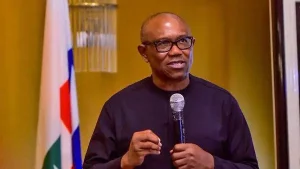
01:25 p.m: Mr Tsammani upholds respondents’ objection to the admissibility of evidence tendered by Mr Obi’s web engineer, Mpeh Ogar, regarding a technical glitch observed on INEC Results Viewing portal on the election day.
The judge held that Ms Ogar was an interested party in the petition having vied for elective office at the polls on the platform of the Labour.
01:38 p.m: Mr Tsammani says the petitioners’ allleged over-voting in some states but failed to specify the particular polling units where the alleged malpractices took place.
The petitioners failed to state the specific figures the scored at the units.
1.44 p.m: Mr Tsammani again restates that that Mr Obi only made generic allegations of irregularities without specifying the particular polling units.
He says the petitioners have no justifiable reasons not to specify the polling units since their agents were present at all polling units and received duplicate copies of the result sheets.
1:44 p.m: The court says the issue of blurred 18,000 results sheets alleged by the petitioners is misconceived as they were unable to state the specific polling units they were meant for
2.02 p.m: Mr Tsammani now begins considering the merit of Mr Obi’s petition.
1.59 p.m: On the tendering of Tinubu’s academic record from the Chicago State University and the US embassy letter to the Nigerian police clearing Mr Tinubu of any criminal record in the US, the court dismisses Mr Obi’s objections to the admissibility of the documents.
2.14 p.m: Mr Tsammani highlights the four (4) issues that will be adopted to resolve the petition.
2.19 p.m.: The court says the issue of qualification of Mr Tinubu and Mr Shettima to contest the election on the basis of alleged double nomination was already resolved in the APM’s case.
2.17p.m; The court is dealing with the second (2nd) issue which has to do with alleged non-qualification of Mr TInubu based on his alleged criminal record in the US.
2.18 p.m: Mr Tsammani says the operative words used in the section 137(1) of the Nigerian constitution cited by the petitioners sentence: “sentence”, imprisonment” and “fine”.
2.23p.m: Mr Tsammani says the judgement of US District in Northern Illinois which ordered the forfeiture of Mr Tinubu’s $460,000 in a drugs-related case was in civil proceedings in which Mr Tinubu was not a party.
2.29 p.m: Mr Tsammani cites an exhibit tendered by Mr Tinubu’s legal team which was a letter written by the US embassy stating that Mr Tinubu had no criminal record in the US.
2.31 p.m: Mr Tsammani also holds that there was no certificate from US authorities required to support any judgement issued by a foreign court to be enforceable in Nigeria as stipulated in the Nigerian constitution.
2:32p.m: The court holds that the US court’s order of forfeiture of $460,000 over drug trafficking in the US was in the context of a criminal conviction.
It says Mr Obi failed to show Mr Tinubu is disqualified from contesting the election on that basis.
2:33p.m: The court says, the petitioners have the burden to prove their allegation of criminal conviction against the second respondent (Mr Tinubu), but they have evidently failed to prove the allegation.
2:35p.m: The court says, from all the foregoing, Mr Tinubu was not disqualified from contesting the February presidential election. Consequently, issue one is resolved against Mr Obi.
2.38p.m: The next issue to be resolved by the court has to do with the implication of INEC’s failure to promptly upload the photographic election result sheets to IReV.
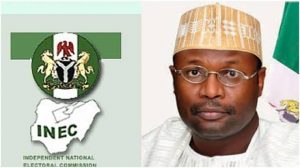 INEC emblem/ INEC chairman
INEC emblem/ INEC chairman2.41 pm: The court dismisses the second issue of non-transmission of result sheets to IReV.
The court holds that there is no law that says INEC must mandatorily transfer or transmit the results of the election from the polling units electronically.
It says the law empowers INEC to decide the means of collation of the results of elections in Nigeria.
2.46p.m: The third issue has to do with the allegation of non-compliance with the provision of the Electoral Act in the conduct of the election, citing INEC’s failure to electronically transmit the results of the election.
Mr Tsammani says Mr Obi is “estopped” (prohibited) from raising the issue again after it was resolved by the Federal High Court.
2:56p.m: The only technological device that is mandatory for INEC to use for the election is the Bimodal Voters Accreditation System (BVAS), M Tsammani says
He adds that there is nothing in the regulation to show that the BVAS must electronically transmit polling units results.
3:13 p.m: the court says both Electoral Act and INEC regulations provide for manual collation of results, and electronic transmission is at best optional.
3.41 p.m: Mr Tsammani says Mr Obi failed to establish that INEC deliberately refused to promptly upload polling unit results to IReV in order to manipulate the results in favour of Mr Tinubu.
3:33p.m: Peter Obi’s web engineer’s evidence concerning IReV portal glitches, added no value to the petitioners’ case. The court adds that the witness’ documentary evidence was unsigned.
Key issues the Presidential Election Petition Court has resolved so far:
– Allegation of double nomination raised against Vice-President Kashim Shettima was false, so his nomination as Mr Tinubu’s running mate was valid.
– Mr Tinubu was qualified to contest the 25 February election
– 10 out of 13 witnesses of Peter Obi not competent to testify.
– EU report on the outcome of the 2023 election was inadmissible.
– The reports tendered by Mr Obi’s expert witnesses lacked probative value.
– The US court’s judgement ordering the forfeiture Mr Tinubu’s $460,000 in a drugs-related case does not disqualify him from running for the presidency.
– Failure of INEC to upload the photographic copies of polling unit results to IReV real time does not invalidate the election.
– INEC is not bound to transmit election results electronically.
– No evidence to show that INEC deliberately refused to upload copies of polling unit results to IReV in order to manipulate it.
4.02 p.m: The court rules that Mr Obi fails to prove the allegations of non-compliance with the Electoral Act in the conduct of the election.
4.03 p.m: The court is now dealing with the issue of corrupt practices during the election.
4.05 pm: Mr Tsammani highlights the issues of corrupt practices which Mr Obi alleged marred the election to include: suppression of votes, inflation of votes, alteration of results, and over-voting.
Mr Tsammani recalls that some paragraphs relating to these allegations had been earlier struck out for being too vague and generic without any particulars.
4.32 p.m: The court says the petitioners failed to lead any credible evidence to prove their allegations of suppression of votes, wrong computation of results, manipulation of results, and inflation of results.
Of the 13 witnesses they called, only two were presiding officers who were present at the polling units, the court adds.
The court says the petitioners, allegations were mere speculations and unfounded allegations.
4.55p.m: On the issue of overvoting, Mr Tsammani says the petitioners failed to specify the polling units where oververting took place.
He adds that the petitioners also failed to specify the number of votes and the margin of lead affected by overvoting.
This means, the judge says, the petitioners failed to establish the allegations of corrupt practices.
Issue 3 is also resolved against the petitioners, Mr Tsammani ruled.
4.39p.m: The fourth and last issue to be resolved is the issue of 25 per cent of votes in the FCT with regard to section 134(2) of the Nigerian constitution.
This is about the most contentious issues stressed in Mr Obi’s petition.
4.44p.m: Mr Tsammani holds that the interpretation of section 134(2) of the Nigerian constitution by Mr Obi and the Labour Party to the effect that a candidate must win 25 per cent of votes in FCT in addition of scoring 25 per cent votes in two-third of the 36 states of the federation “is completely fallacious”.
4:45p.m: The argument of Labour Party’s lawyers that the 2nd Respondent ought not to be declared winner of the election because he scored less than 25 per cent votes in the FCT is “fallacious and incredibly ridiculous.”
A broad interpretation of the Constitution should prevail.
4.50p.m: The court, in interpreting the constitution, must give consideration to the principle of the constitution rather than literal or direct interpretation of the provision, Mr Tsammani says.
4.51p.m: Mr Tsammani says the first port of call would be to consider the directive of state policy and the preamble of the constitution that provides for the equality of citizens.
4.54p.m: Mr Tsammani says from the reading of section 134 of the constitution, the reference to the states of the federation and the Federal Capital Territory indicates nothing more than the consistency of how the constitution refers to them throughout all the provisions whenever they are metioned together.
5.00p.m: Court dismisses Peter Obi’s petition.
It says the petitioner was unable to prove any of the three grounds upon which the petition was anchored.
5.01p.m: APC’s lawyer, Mr Edosomwan asks the panel to specifically urge the court to say the petition was dismissed.
But the panel members responded with cautionary remarks by telling him they knew what they were doing.
5.03p.m: The court begins judgement on Atiku’s petition, which is the last.
5:03p.m: Justice Moses Ugo of the five-member panel began reading the judgement in Atiku’s case against President Tinubu.
5.25p.m: Mr Ugo highlights gaps in Atiku’s petition.
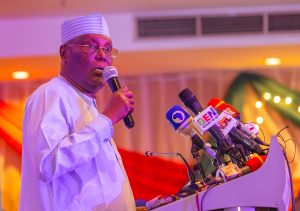
He says the petition is filled with nebulous and generic allegations.
He says the petition also failed to specify particular polling units where the malpractices took place.
He also identifies non-joinder of necessary parties, such as Governor Yahaya Bello of Kogi State who was accused of malpractices during the election in his state.
5.32 p.m: Mr Ugo spotlights paragraphs of Atiku’s petition that are “imprecise and vague”. He also said others “lack particulars”.
5:37p.m: Kogi State governor, Yahaya Bello, puts up suprise look at the mention of his name by Justice Ugo concerning “gun-toting thugs” who allegedly disrupted polling in Kogi State during the presidential election.
6.09 p.m: The court dismisses many paragraphs in Atiku’s petition.
Mr Ugo completes part of the ruling on the preliminary issues.
“I now hand over to the leader, as politicians will say,” Mr Ugo said.
The head of the panel, Haruna Tsammani, then asks the second most senior judge on the panel, Stephen Adah, to continue.
6.22 p.m: Mr Adah points out failure of Atiku to file the witness statements on oath along with his petition.
6.24 p.m: PDP’s lawyer, Chris Uche, a SAN, smiles as the court cites his comment in a book in which he took a position on the need for all depositions to be filed within along with the petition specified timeframe different from his contention in the current Atiku’s case.
6.29 p.m: Mr Adah reminds Mr Uche how he had endorsed the position taken by the author of the book, and recommended it to judges.
“I shall hold counsel to his words,not only because they are coming from him, but also because they are true,” Mr Adah said.
6.40 p.m: Mr Adah rejects 15 witnesses called by Atiku on the grounds that their witness statements on oath were not filed along with his petition.
Mr Adah also expunged 37 exhibits tendered by the witnesses from the court’s records.
6.59 p.m: People are leaving the courtroom in droves. The courtroom which was packed at the time the proceeding started in the morning has been reduced to almost half of the attendees.
The proceeding has lasted almost 10 hours.
Many seats behind the lawyers’ rows are now vacant.
7.10 p.m: Mr Adah hands over reading of the judgement to the head of the panel, Haruna Tsammani. This marks the end of rulings on the preliminary issues raised.
Mr Tsammani is now dealing with the substantive petition.
7.21 p.m: Mr Tsammani highlights four (4) issues that will determine Atiku’s petition.
7.22 p.m: The four issues that will determine Aiku’s petition, according to the court, are:
– Whether the return of Mr Tinubu was invalid by reason of substantial non-compliance with the Electoral Act in the conduct of the 25 Feb. election.
– Whether Tinubu was lawfully declared the winner of the election when he did not secure 25 per cent of the votes in FCT.
– Whether Mr Tinubu was not disqualified from contesting the election after a US court’s forfeiture order against him in a drugs-related case in 1993.
– Whether Mr Tinubu was lawfully declared as the winner of the election based on the majority of lawful votes.
7.33 p.m: For a petitioner to successfully prove non-compliance with the Electoral Act, the petitioner must call witnesses to prove the acts of non-compliance and show that the acts affected the outcome of the election, says Mr Tsammani.
He says Atiku failed to call any of his polling unit agents who signed the polling unit results and witnessed what took place in their domains.
He says the few agents called by the petitioner were state and national agents.
7.37 p.m: The political parties are not expected to appoint an octopus as polling unit agents that will have its tentacles in all polling units, says Mr Tsammani.
He adds:
– When a petitioner is expected to prove an anomaly in a polling unit, it is only the witness who saw it happen that is competent to testify on it.
– No other person can validly testify on such acts of non-compliance.
7.42 p.m: Mr Tsammani says of the 27 petitions called by Atiku, 10 of them were presiding officers at their polling units in different states.
The judge highlights the thrusts of the testimonies about how they successfully conducted the election at their polling units but could not connect with IReV.
The witnesses also said party agents signed the results. The polling officers also spoke of how they took the results to the ward collation centres.
7.47 p.m: According to the judge, the testimonies of the presiding officers called by Atiku as witnesses were “so clear and cogent that the election went well.”
7.48 p.m: The judge says the presiding officers called by Atiku to testify for him insisted that “the election went well, but that the only issue was that they were not able to connect to INEC’s portal.”
7.55 p.m: The court says electronic storage of results after the conduct of the election is not part of the election process.
It insists that the law only provides for manual collation of results and not electronic collation.
8.06 p.m: The petitioners have not been able to prove that it is mandatory for INEC to electronically transmit the results of the election – Court
8.16 p.m: The court says, although there is provision for transfer of scanned copy of polling unit results in addition to physical transfer of the results to the collation centre, the only technology recognised by the law is BVAS for verification and accreditation of voters.
8.18p.m: The court also says that BVAS is not a device for transmission of results to any collation system. Mr Tsammani, the judge reading the judgement, says IReV into which the scanned copies of polling unit results could be transferred is not a collation system.
8.30 p.m: This judgement has now gone on for 11 hours with only 15 minutes break in-between.
So far, the court is still dealing with only one of the four issues it highlighted as the questions that would determine Atiku’s petition against Tinubu.
8.30 p.m: The court has just resolved the issue 1 which is about non-compliance with the provisions of the Electoral Act.
The court rules that Atiku and his party failed to prove that the conduct of the 25 February 2023 election did not comply with the provisions of the Electoral Act 2022.
8.32 p.m: The court resolves the second issue which has to do with 25 per cent of FCT votes against Atiku and in favour of Tinubu and other respondents.
The court adopts its reasoning in its earlier ruling on the issue.
8.34 p.m: The court also resolves the third issue.
The issue whether Mr Tinubu was disqualified from contesting the election after a US court’s forfeiture order against him in a drugs-related case in 1993.
The court resolves this point against Atiku and in favour of Mr Tinubu and other respondents.
The court holds that Atiku “failed to plead facts of qualification and non-qualification” to support their argument.
8.41 p.m: The court is dealing with the fourth and last issue.
The issue is whether Mr Tinubu was lawfully declared as the winner of the election based on the majority of lawful votes.
8.46 p.m: The court holds that when the acts of non-compliance complained of by the petitioners are not manifestly disclosed in documents, the petitioner needs to call a witness to prove them.
8.48 p.m: The court holds that Aiku merely dumped his documents tendered to prove non-compliance on the court as none of his witnesses linked the documents to his case.
8.52 p.m: It is clear that the petitioner failed to lead credible evidence to prove allegations of corrupt practices during the election – Court.
8.55 p.m: The court says Aiku’s petition and those of Peter Obi and the APM were devoid of merit.
8.55 p.m: The second judge, Stephen Adah, adopts the lead judgement by Mr Tsammani, by affirming the declaration of Mr Tinubu as the duly elected president of Nigeria.
9.00 p.m: The third judge on the panel, Misitura Bolaji-Yusuf, the only female on the panel, also affirms the election of Mr Tinubu by adopting the reasoning in the lead judgement.
9.25 p.m: The fourth member of the panel, Moses Ugo, takes his turn to deliver his own opinion. He also agrees with the reasoning and conclusion of the lead judgement on the three petitions.
9.45 p.m: The fifth judge and last judge on the panel takes his turn to also affirm Mr Tinubu’s election by similarly concurring with the reasoning and conclusion of the lead judgement. He concurs with the lead judgement dismissing all three petitions by Atiku, Peter Obi, and APM.
His opinion makes the judgement of the five-member panel of the Presidential Election Petition Court affirming President rTinubu’s election a unanimous decision.
9.55 p.m: The last of the five members of the panel, Abbah Mohammed, makes the final pronouncement, disissing all three petitions.
9.57 p.m: The head of the panel, Haruna Tsammani, said his team had completed its national assignment and thanked lawyers in the case for their cooperation.
9.58: PDP’s lawyer, Chris Uche, requests that copies of the judgement be made available immediately to enable his client to exercise his right of appeal to the Supreme Court.
The judgement lasted over 12 hours.
